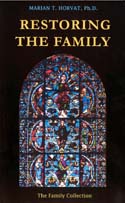 |
Morals
Moral Questions
What Is the Punishment for an
Unwed Father?
Fr. Paul Sretenovic
Dear Fr. Sretenovic,
I have been reading with interest your comments about how the situation of unwed mothers should be dealt with, and I would like very much if you would pen an addendum in these internet pages as to how the young man in the unwed mother case is to be dealt with. After all, “it takes two to tango.”
Should the young man suffer a similar fate as the young woman? Both need repentance and amendment of life, do they not?
Please advise me in this issue, as there are several cases in my parish for which I would appreciate guidance.
With gratitude,
B.L.M., father of three late-teen/early twenties daughters
May Our Merciful Lord protect my daughters from such circumstances.

Fr. Sretenovic responds:
Dear B.L.M.,
I thank you for your inquiry because it gives me the opportunity to present the “other side” of the punishment for an unwed mother, that is, the moral and social punishments the unwed father should have, or at least could have. It is a good occasion to expose the Catholic teaching and customs on this.
Let me deal simultaneously with the doctrine and its application to our days.
Regarding sin, both man and woman committed mortal sins before God since they disobeyed the Sixth Commandment. Normally speaking, the man is guiltier than the woman, because she has a weaker will that is easier to bend and to fool, a traditional reason for parents to keep their daughters under their wings.
With today’s feminism on the rise, however, this last rule suffers significant variations, especially in our country where unfortunately we increasingly see more men who act like big boys, controlled by their mothers or other women. Thus, it may be the case - and many times it is - that the woman takes the initiative in the sin. I am not only referring to the many insinuations women use to seduce men, but to the direct invitation to sin.
When sincere repentance is present, absolution for their sin is given insofar as they are willing to make amendments for their actions. In the case of a child born out of the wedlock, the amendment for the father is double: one is his responsibility toward the mother, another toward the child.
The obligation of the unwed father toward the mother
Once his paternity is indisputable, normally speaking, the man has the moral obligation to marry the woman, if he is not already married. This is the only situation that can legitimize her pregnancy and the birth of her child. It will make their situation legitimate before God and society. As long as the marriage is not unfeasible for other reasons – difference of religions, shameful past of one of the parties, blackmail of one party to take advantage of the wealth of the other, and other such reasons – the parents of both parties should enter into accord to arrange the marriage.
This is what Scripture tells us about Dina, the daughter of Jacob (Gen 34). Dina was violated by Sichem, a pagan from the city of Salem, who subsequently wanted to marry her. Sichem’s father, Hemor, the king of that people, approached Jacob to ask not only for his daughter’s hand in marriage for his son, but also a union of the two peoples. Toward this end, he offered to convert to the religion of Israel. Both the father and the son acted correctly, according to Natural Law and Catholic Morals.
When the young man was undecided about marrying, the civil authority in the well-constituted States of the past would oblige him to do so for the sake of public morality and to preserve the honor of the young woman, supposedly an honest woman.
![K015_abelard_heloise1_cr[1].jpg - 25308 Bytes](religiousimages/K015_abelard_heloise1_cr[1].jpg)
Canon Fulbert discovers the affair of Abelard and Heloise |
When there were not such laws governing the situation, the members of the family of the offended girl would take measures to avenge the fault and prevent the seducer from continuing to prey with impunity. We know from History that Abelard seduced Heloise, who was the niece of the Canon Fulbert of Notre Dame of Paris. When her uncle became aware of Abelard’s abuse, he purely and simply castrated him.
There is discussion whether they had married before her uncle’s intervention, an argument I am not entering here. I am just mentioning this case to show how society used to punish the violation of a woman’s virginity. Canon Fulbert resolved the case in a very simplistic way. I am not sure that this action is corroborated by Catholic doctrine. However, it seems that the punishment was proportionate according to Natural Law: he caused the loss of her virginity; the uncle caused the loss of his virility.
The mentioned episode of Dina had a more complicated unfolding with regard to the offense made not just to the girl, but to the honor of the family. In this case, two of Dina’s brothers – Simeon and Levi - took measures to avenge the misdeed.
They told Hemor that to be incorporated into the Jewish religion, all of the men of his city would need to be circumcised before the marriage could take place. When they agreed and all men of Salem were suffering from the pains of the circumcision, the Jews killed all the men and looted the city, bringing shame upon Jacob and all Israel.
This treachery - using a religious act, circumcision, as bait - is severely judged by the Doctors of the Church. Cornelius A Lapide in his commentary on Genesis summarizes those condemnations of the Jewish action as simultaneously a lie, perfidy, disobedience, sacrilege, cruelty, excess in revenge, temerity and impiety. Yet, in the Book of Judith (9:2), this act is praised, not because of the sin of the brothers of Dina, but because of God’s justice, which was served even in sin to avenge the defloration of Dina. Here again, Scripture endorses Natural Law.
If nothing else, such examples should serve as a reminder of God’s justice for those men who today can, in fact, get away with having a child out of wedlock without taking any responsibility for their actions. It is good for them to know that God is not mocked without reparation, and while His punishments may arrive late, they will come just the same.

The gauchos of south Brazil would severely punish young men who violated women |
This sort of social punishment is not only reminiscent of the Old Covenant or the Middle Ages, but remnants of it existed in Catholic countries until the last century. For example, a friend told me that until the 1950s and ‘60s, when virginity was still the rule for an upright young woman, in several states of Brazil it was a custom for the brothers and cousins of the offended girl to find the man who refused to marry her and castrate him. It was a sanction normally accepted by society, which protected the virtue of the girl and the honor of the family. Again, I am not saying that this should be put into practice here and now. I am just answering your question about the social sanctions against the offending young men that used to be used in a Catholic society.
Today, this would be very difficult to apply since we know that the Cultural Revolution, with all its means of propaganda, has successfully attacked virginity as an ideal for young women. Also, the Clergy after Vatican II no longer teaches the importance of virginity, or form good customs that help to preserve it. Consequently, a general atmosphere of free-love has been established, in which countless young women have impure relations with countless young men. How can any moral rule of paternity or any demand of family honor be seriously applied when girls are promiscuous?
As an ideal, the least that can be demanded in a Catholic society is that the man should be required by law to marry the woman he violated, especially when the girl is pregnant. This would rectify the situation in the public forum.
The father and the child
If the man is already married and a child is to be born, he should make arrangements to guarantee the sound spiritual formation of the child. Regarding the mother, he cannot change her situation as an unwed mother. Certainly, he can help her financially, and is required morally to do so, but this does not legitimize her situation. She has to suffer the social consequences of her act, as I already explained answering other questions.
Similar cases where the father cannot marry the woman occur for different reasons. For instance, the woman is a prostitute, or she clearly seduced him to obtain a part of his patrimony, or she is a Satanist. Similar to the case of a married father, here also he should make arrangements so that the child, the blood of his blood, will have a good spiritual formation that will favor his eternal salvation.
To help resolve the situation of the child, I return to some practical suggestions I presented when I dealt with unwed mothers: to arrange for the child to be raised by someone in his family, the godparents of the child, etc.
This is what occurs to me at this moment to answer your question. I hope it will be of assistance for you in the formation of your three daughters.
In view of the very bad times in which we live, I will be praying especially for you and for them.
In Christ,
Fr. Paul Sretenovic

Posted September 8, 2008

Related Topics of Interest
 Divorced Parents; Unwed Mothers Divorced Parents; Unwed Mothers
 Unwed Mothers: the Calvinist and the Catholic Answers Unwed Mothers: the Calvinist and the Catholic Answers
 The Dignity of Women Lies in Moral and Physical Purity The Dignity of Women Lies in Moral and Physical Purity
 Virginity Is Higher than Matrimony Virginity Is Higher than Matrimony
 How to Prevent Daughters from Dressing Immorally How to Prevent Daughters from Dressing Immorally
 St. John Fisher and the Divorce St. John Fisher and the Divorce
 Annulments - Comments by Readers Annulments - Comments by Readers
 Vatican II Inverted the Ends of Marriage Vatican II Inverted the Ends of Marriage
 Problems of Conscience on Marriages, Live-ins, Baby Showers Problems of Conscience on Marriages, Live-ins, Baby Showers


|

Morals | Religious | Home | Books | CDs | Search | Contact Us | Donate

© 2002-
Tradition in Action, Inc. All Rights Reserved
|
 |
|